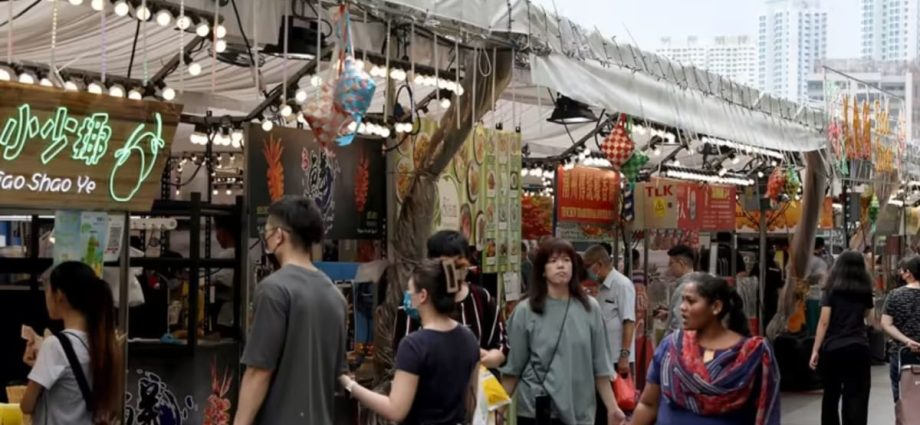
The grouses aside, these pasar malam and bazaars in general continue to draw crowds.
For example, Associate Professor Muhammad Faishal Ibrahim, Minister of State for Home Affairs and National Development, said that the bazaar at Geylang Serai had attracted over 3 million visitors as of Apr 14, a week before the bazaar was scheduled to end.
But vendors who TODAY spoke to at various pasar malam and bazaars said that business was less brisk than in previous years.
“The crowd is still there, although a bit less since after COVID-19-reopening. I think because many are used to buying things online already,” said Mr Hussin.
“Even though there’s a crowd, they are buying a lot less items because each item now is more expensive. Which is why I try my best to sell my items cheaper and bank on volume of sale.”
Even then, he projected that his overall profit would take a significant hit this year.
Worse still, some vendors at the Geylang Bazaar said they had seen some stallholders being evicted due to their inability to pay rent. Mr Mustaffa confirmed with TODAY that some evictions had occurred.
He said that having been a stallholder himself at the bazaar many years ago, he sympathised with these vendors. However, he added that they were evicted only as a last resort after being issued multiple reminders and warnings for not paying rent.
“I feel kesian (pity) for them also. But the thing is, these vendors can come into our office and ask for discounts and all that, but we cannot go to Wisma (Geylang Serai) and ask for a discount in turn. Because we already paid in full before the bazaar started,” he added.
Wisma Geylang Serai is the body under PA in charge of organising the Ramadan bazaar.
THE THORNY ISSUE OF TENDER VALUE
To organise a pasar malam, interested companies would first have to submit a tender to PA and indicate a tender value. If successful, the company would then have to pay the tender value to PA.
Replying to a parliamentary question on Friday, Minister for Culture, Community and Youth Edwin Tong, whose ministry oversees PA, said that trade fairs are organised through an open tender process to appoint a professional fair operator to manage and operate the event.
The successful tenderer will set the rent “based on market rates”, he said in response to a question by opposition Member of Parliament Faisal Manap from the Workers’ Party.
“An entity or individual who intends to bid for a stall will know in advance the rental rates which are proposed to be charged, as well as the other details on which the trade fair or bazaar is operated. They can then assess whether to make a bid,” said Mr Tong.
Citing the Ramadan bazaar at Geylang Serai as an example, the minister highlighted that “a fair number” of holders also took up more than one stall.
Replying to a supplementary question by Mr Faisal, Mr Tong added that the point of the tender “is not to get the bidder with the highest price, but the bidder with the best expertise, the best proposal”.
“In considering the tender, price is one factor amongst others. In the case of the (Geylang Serai Ramadan) bazaar, the award did not go to the bidder with the highest price,” the minister said.
PA did not respond to TODAY’s queries asking for further details on the tender evaluation process in general, how prices have changed over the years as well as a list of companies that have successfully won tenders to organise trade fairs across the island.
However, a spokesperson of the organisation told TODAY that “all the proceeds” from this year’s Geylang Serai Ramadan bazaar “are used for the community”.
These would include funding the Hari Raya Light-Up and programming to build a festive atmosphere to the 36-day bazaar, supporting collaboration between Wisma Geylang Serai and Malay-Muslim organisations, as well as providing community and social programme to assist low-income families and the elderly.
TODAY’s check of Gebiz, the government procurement site, shows that the tender for Ramadan bazaar at Geylang Serai this year was awarded to a consortium of three companies comprising TLK Events Management, Enniche Global Trading and S-Lite Events, at a value of S$2.26 million.
The consortium’s bid was the second-highest among seven proposals, behind an automotive retail company Cili Padi Auto which submitted a tender value of S$2.53 million.
Mr Mustaffa said that in previous years, 50 per cent of the evaluation weightage was given to the tender price, while the remaining 50 per cent was based on other qualitative considerations such as the proposed concept for the bazaar and the organiser’s track record.

